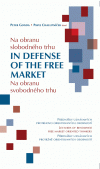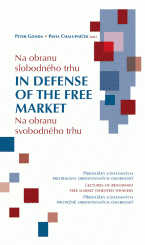 |
|||||||
| INSTITUTE | CONSERVATISM | M.R.STEFANIK |
| PUBLICATIONS
|
[03.06.2007, Pavel Chalupníček, PUBLICATIONS]
However, it would be naive to think that any human action must lead to prosperity. The forces of good and evil quarrel inside of all human beings, by their nature imperfect. Whether self-interest will be directed in a way to benefit, not to harm others, is primarily a question of social institutions, which shape human actions. What Smith only outlined in his famous Inquiry into the Nature and Causes of the Wealth of Nations is today elaborated in the theories of a rapidly evolving branch of social sciences – of institutional economics. In spite of popular belief, it is not true that these “beneficial” institutions must be intentionally created by some higher authority (for example by the government); on the contrary, they are created spontaneously by interactions among individuals. As James M. Buchanan shows in his text, the markets, for example, are able to create – thanks to the principle of reciprocation – certain ethical rules whose observance is in the interest of all market parties. The main conclusions of institutional analyses of a society can be briefly summarized: The development of the society, the decision whether the country is going to be poor, or wealthy, is not primarily decided by material facts, as was asserted by Marx and his followers, but rather by phenomena of immaterial nature, by rules, norms or ideas. That is, by social institutions. To some extent, these can be deliberately altered “in the right way” by people and James M. Buchanan shows that this is possible to a greater extent than is generally believed. A human being is not completely subordinate to, and left at the mercy of, some “superior power” or material conditions of his or her existence, but an individual can – with awareness of the limits of his or her own knowledge – discover and comprehend the role of social institutions. Unfortunately, this often happens only when a particular institution is suppressed or destroyed. This is entirely true for the crucial institution and pillar of free society, for private property, as Josef ©íma reminds us. The reminder is more than relevant for our country, in many respects still too post-socialist, where property rights have been violated from the very beginning of its existence (the first measures of land reform in 1918 were taken even before the provisional constitution of the newly created Czechoslovakia was passed) and where expropriation became common policy throughout the 20th century. Although we can hope that its worst manifestations have passed, some people are still visibly expropriated today (during construction of a highway or an industrial zone); or less visibly but in greater scope (through taxation or regulation). What term other than “expropriation” is more appropriate to use when an individual cannot fully control his or her property, which is, as John Locke stated, “the fruit of his labour” and therefore in ownership? Contrary to popular opinion, expropriation, that is, mainly taxation, does not only burden the rich and unconditionally benefit the poor. Today, intricate tax systems and even more intricate rules of redistribution and construction of social benefits, tax exemptions and subsidies, lead the state to take from those who are economically active, who create and innovate, and to give to those who only passively wait and hold out their hands, no matter how wealthy they are. Politicians rotate the wheels of their redistribution machine amidst applause by those who will be able to take the property of their neighbors without penalty and by law. Is this situation “socially just”, asks Anthony de Jasay in his lecture, or is it the reverse of what is understood by this concept in a free society, based on respect for property? If national economic policies are torn by specific interests of different groups, this holds even more true at the supra-national level. As explained by Pascal Salin, the European Commission and other EU institutions somewhat schizophrenically fight for competition in the economy, but they forget that similar mechanisms operate in politics as well. Harmonization in the name of the “single market” gradually creates a cartel of national governments, which may possibly – if the political integration continues in the same spirit – transform into a political monopoly of Brussels in the future. Questions about the democratic nature of European integration (unsuccessful referenda repeated after massive propagandistic campaigns, “deficit of democracy” of EU institutions, etc.), as well as the amount of money to be redistributed and regulations to be implemented, are mounting, and are influencing everyday life on the entire continent. How do we escape this vicious circle in which, in Bastiat's words, “all live at the expense of others”? In his essay, Václav Klaus summarizes the work of Ludwig von Mises, one of the greatest and most original economists of the 20th century. Mises’ contribution based on methodological foundations of strict individualism and subjectivism is a signpost showing the way to freedom. It was Mises, who in his masterpiece Human Action described the unpleasant consequences of the many steps and institutions usually labeled as serving the “common good”. Mises’ work, unique in its coherence and thoroughness, builds on solid foundations laid by Smith. His framework is composed of simple ideas, understandable and accessible to anyone who has retained at least a trace of critical spirit in the times of all-embracing nanny states. Ron Paul, the second of the two politicians present in the book you are about to read, is one such critical person, in spite of his occupation. He is a real live example, which shows that Mises’ ideas need not stay only on paper, but can be successfully translated into practical political action. Although Mises himself was skeptical about this possibility, the story of Ron Paul and his unwavering fight for freedom disprove Mises’ skepticism to a large degree. The lecture of Bjørn Lomborg, a Danish statistician, is encouraging in a similar way. Against the flood of “scientific” news about the supposedly catastrophic impact of global warming, he is not afraid to go against the stream. He is not afraid to remind us of the evident truths – that thanks to human creativity the state of our world is improving in an overwhelming number of areas, that the “green” movements also follow their political interests and that models of global warming are at the very least controversial, and even the best data we have do not confirm the wild theories so favored and promoted by radical activists and politicians. His emphasis on acting with a cool head and opposing one-shot measures enforced by “the pressure of the street”, or narrow interest groups, undoubtedly contributes to a more rational discussion about this global problem. Lomborg's example also highlights how important it is to bring unusual and controversial arguments into the public debate, and how important it is to create an alternative to the “official sources” of the state and its agencies. The search for the real consequences of even well-intended human actions, and the search for changes wrought by social institutions, is difficult and long, and there is no better way to search than through free discussion. Let this work be a guide on our journey. Pavel Chalupníček
|
 English | Slovak
English | Slovak
This website was created also thanks to funding granted by The Trust
for Civil Society in Central and Eastern Europe.
Website powered by Metafox CMS from Platon Group.
|
Conservative Institute of M. R. Stefanik |
Tel.:
+421 258 100 188 |

 In the history of economic science we could hardly find a more often cited, and yet not fully appreciated; more hated and admired; more ridiculed and highly esteemed term than the “invisible hand” of Adam Smith. The importance of Smith‘s idea is confirmed by the fact that even 230 years after its publication it still excites crowds of scientists, and stimulates them to uncover deeper connections and practical consequences of human action through which a person “by following his own interest benefits others”.
In the history of economic science we could hardly find a more often cited, and yet not fully appreciated; more hated and admired; more ridiculed and highly esteemed term than the “invisible hand” of Adam Smith. The importance of Smith‘s idea is confirmed by the fact that even 230 years after its publication it still excites crowds of scientists, and stimulates them to uncover deeper connections and practical consequences of human action through which a person “by following his own interest benefits others”.





